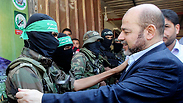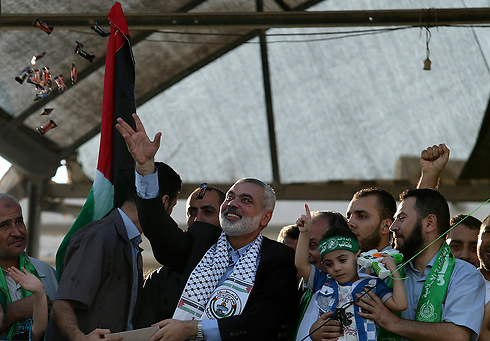
Top Hamas official alludes to direct talks with Israel
Mousa Abu Marzook says no religious impediment to such negotiations; Perry: Israel won't talk to Hamas unless it accepts Quartet demands.
Senior Hamas official Moussa Abu Marzook hinted Thursday that the organization would not to veto direct negotiations with Israel, if circumstances forced it to hold them.
In an interview to the Hamas-affiliated Al-Quds newspaper, Marzook said that, in light of international efforts to begin talks on a ceasefire in the wake of Operation Protective Edge, there was no obstacle in religious law to negotiations with Israel.
Related stories:
- Hamas: Cairo truce talks to resume mid-September
- Nahum Barnea / Mahmoud Abbas' next move
- Creating a strong axis for peace
"Just as we are negotiating with the occupation using weapons, so one can also negotiate with words," he said. "Until now, our policy has been not to negotiate with Israel, but one must understand that such a thing is not taboo. If the current situation will remains as is, and because it has almost become a public demand in the Gaza Strip, Hamas may find itself adopting such a policy."
But Communications Minister Yaakov Perry, a former head of the Shin Bet, said Thursday that Israel would not negotiate with Hamas until it accepts the basic tenets of the international community.
"As long as Hamas does not abandon the path of violence and terrorism, recognize the right of Israel to exist or accepted the conditions of the Quartet, Israel will not conduct direct negotiations with that terrorist organization," Perry told Israel Radio.
The EU is trying to promote ceasefire negotiations between Israel and Hamas, and aims to start talks towards the end of next week in Cairo. Until now, Hamas has rejected any formal negotiations with Israel. Previous talks, such as the deal to free captive IDF soldier Gilad Shalit and ceasefires after rounds of fighting in Gaza before Protective Edge, were only conducted indirectly through third parties.
After the final ceasefire was reached three weeks ago, informal understandings were drawn up to form an outline on which future talks would be based. These discussions will address the opening of the Gaza border crossings, entry of humanitarian aid and building materials into the Gaza Strip, and the expansion of the fishing area for Gaza fishermen.
The main question is when - if at all - Israel and Hamas will tackle more complex and contentious issues such as prisoners and a Gaza seaport and airport.











